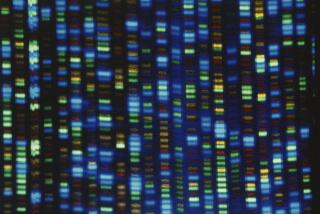Cancer Data ‘Will Change Everything’
- Share via
In an effort to understand the link between genetics and environment, the National Cancer Institute has awarded UCI $6 million in grants to set up two research databases that will collect, analyze and disseminate information on hundreds of thousands of people nationwide who are genetically predisposed to cancer, officials announced Friday.
One of the two Internet-based “informatics” systems will be the core of the institute’s soon-to-be-launched Cancer Genetics Network, composed of up to eight research centers nationwide where cancer patients and their families will be studied.
Those sites--to be announced within the next several weeks--will send UCI data on patients’ cases, their genetic makeup, their families’ genetics, tissue samples, risk factors, environment, preventive strategies and treatments.
“The management of this information is akin to the development of antibiotics,” said Dr. Robert Hiatt, deputy director of the National Cancer Institute’s cancer control and population sciences division. “It will change everything.”
While 95% of cancers are not inherited, in recent years researchers have identified certain genes that are associated with different types of cancer, predisposing people with those genes to the disease, he said.
By making sense of genetics’ interplay with the other factors, researchers hope to provide physicians and the public with information “that will be used right at the bedside,” Hiatt said.
Doctors will be able to see which behavioral and environmental “triggers” can affect genetically predisposed patients, and which treatments are best under varying circumstances, he said. “It is by understanding these genes and understanding the environmental factors that one can actually change one’s destiny.”
Frederic Wan, UCI’s vice chancellor for research and graduate studies, said that, if the pen is mightier than the sword, then in cancer research, information “is mightier than the scalpel.”
The second informatics system at UCI will do the same with information compiled by 12 existing NCI-funded breast and colon research centers in the United States, Canada and Australia.
“UCI will be the key in the mining of a vast repository of data . . . to be shared with researchers, the medical community and the public throughout the world,” said Hoda Anton-Culver, professor and chief of epidemiology at UCI’s College of Medicine.
Hiatt said he recently learned that 30 years ago, Anton-Culver sent in a research proposal to look at family “markers” for cancer. The proposal was rejected by the NCI. Anton-Culver and her fellow researchers “deserve recognition for their vision,” he said.
The grants are a coup for UCI, which competed with research institutions nationwide for the NCI grants. University leaders have been on a quest to elevate the campus’ standing among the nation’s research centers.
UCI is one of about 30 applicants for designation as one of the eight NCI Cancer Genetics Network centers. All applicants had to have existing cancer genetics to expedite the project.
Once those sites are announced, it will take several months for the NCI, UCI and the research leaders at each center to decide the specifics of the data to be gathered before the network can invite people to enroll, authorities said.
UCI already has solicited bids for the sophisticated computer hardware needed for the project, Anton-Culver said.
Among UCI’s challenges will be to design “fire walls” and other security measures so that there are varying levels of access to information over the Internet, they said. Patient confidentiality will be protected by having the network centers send data using codes instead of names. In addition, medical ethicists are overseeing the project, Hiatt said.
Confidentiality “is an important issue,” he said, in response to concerns that insurance companies could use the Internet information to deny coverage.
The program brings hope to families with histories of cancer, said patients participating in other cancer research projects.
One of them, identified only as Wendy, said doctors delayed performing a biopsy on a lump in her breast because her family had no history of cancer. The lump turned out to be cancerous, and she learned soon afterward that the cancer had spread to her bones.
“My hope is that by participating in . . . research, my young nieces will never have to face this,” she said, her voice breaking.






